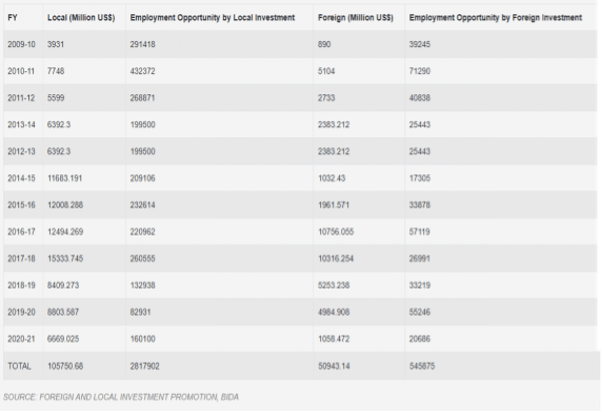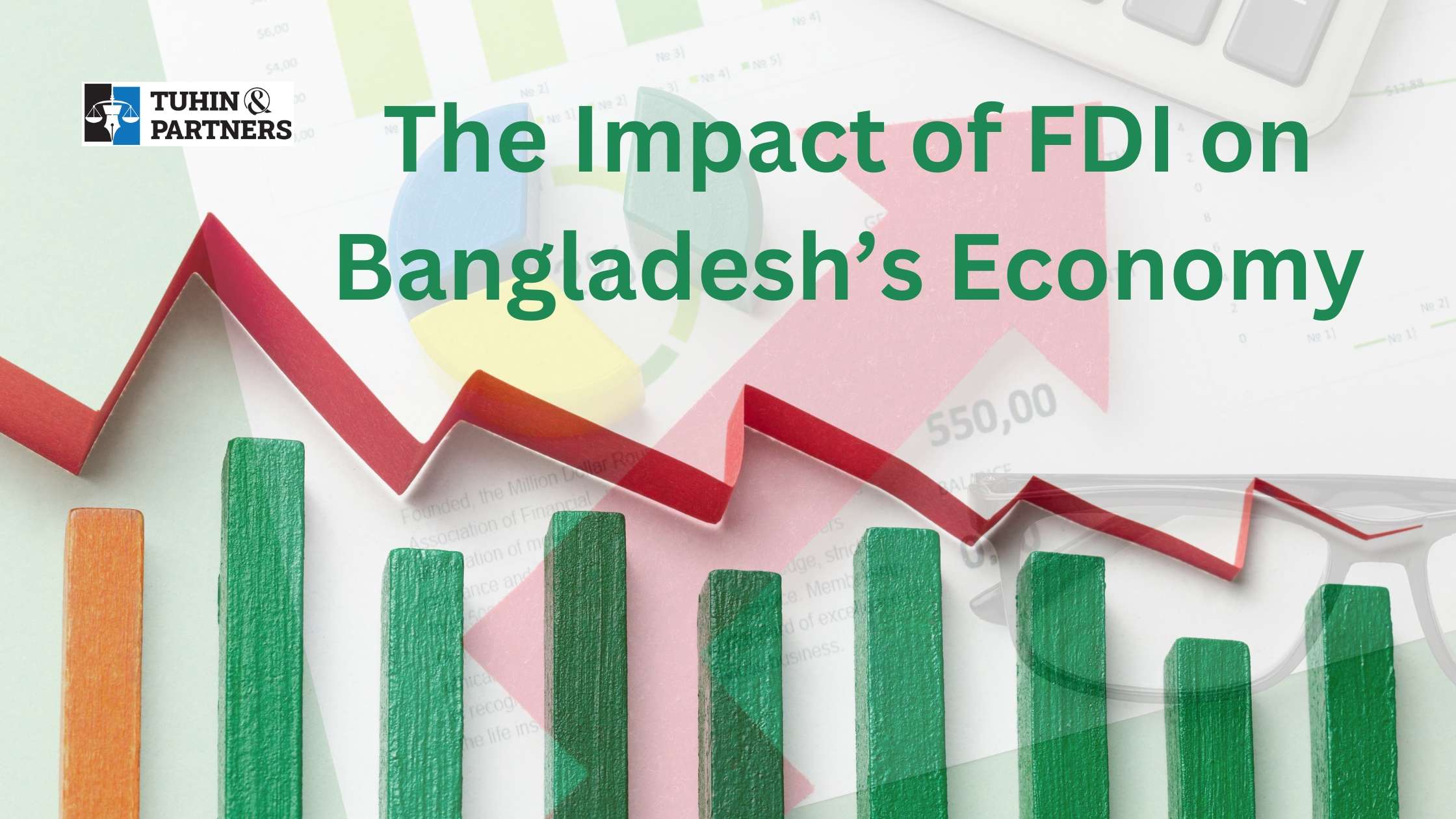Globalization has sparked a blazing fire of Foreign Direct Investment (FDI), a powerful driving force behind economic growth and development worldwide. FDI is crucial in advancing individual countries and the global community, igniting a spark of excitement and hope for a brighter future! Foreign Direct Investment (FDI) is an essential aspect of international economic development that involves investment by foreign entities in the local economies of other countries. It is widely recognized as a valuable tool for diversifying industries, expanding export opportunities, and attracting foreign expertise and knowledge. The impact of FDI on Bangladesh is not less than that of any other country.
Delve into the positive Impact of FDI on Bangladesh economy
FDI inflows significantly impact the economy by providing a stable capital source, which can be utilized for investment in crucial sectors such as manufacturing, energy, telecommunications, and infrastructure. Foreign Direct Investment (FDI) is a powerful tool that can bring new capital to finance projects and expand businesses, leading to new jobs and economic growth.
Moreover, FDI can also stimulate innovation and knowledge transfer by importing new technologies and expertise from abroad. FDI is an excellent opportunity for businesses to grow and prosper while contributing to the development of the economy.
FDI can be a game-changer for local industries. Introducing new products and services, improving production processes, and expanding distribution channels can help them become more competitive. FDI can also boost exports and decrease the country’s dependence on imports, positively impacting the balance of payments. Overall, FDI has become an essential strategy for many countries looking to attract foreign investment and drive economic growth.
Foreign Direct Investment (FDI) can bring significant and long-lasting benefits to a country, provided it is managed effectively. In Bangladesh, FDI inflows may take the form of 100% foreign-owned investments or joint venture projects between Bangladeshi and foreign investors, which can contribute towards balancing the country’s payments.
Did you know that foreign direct investment (FDI) can directly impact a country’s balance of payments (BOP) statement?
In Bangladesh, FDI inflows are reported under the capital and financial account of the BOP statement, which means that this type of investment can play a crucial role in determining the country’s capital and financial account surplus or deficit. FDI-financed companies usually start exporting their products after setting up capital machinery.
Companies with export-oriented business models tend to benefit more from FDI inflow through increased exports than being negatively impacted through boosted imports. Extensive research suggests that FDI-supported firms export more of their output than their local counterparts. Such firms possess a competitive edge in their knowledge of international markets, efficiency of distribution channels, and agility to adapt and respond to the dynamic patterns of global markets.
It’s fascinating to learn that the formulation of Export Processing Zone (EPZ) policies has been identified as a significant factor in enhancing the positive relationship between FDI inflows and exports. Attracting more FDI could be a valuable approach for Bangladesh to address its trade deficit in the long term. It’s impressive how FDI can contribute to developing a country’s economy and opening up growth opportunities.
Employment Opportunity (Impact of FDI on Bangladesh)
Bangladesh’s government has adopted an open-door policy to welcome foreign direct investment to accelerate industrialization and achieve rapid economic growth. BEPZA is the government’s representative organization that draws, promotes, and facilitates foreign investment in the country’s economic zones. The ready-made garments industry has been a vital contributor to Bangladesh’s impressive economic growth over the last three decades, playing a significant role in reducing poverty and empowering women. Over the past few years, there has been a notable rise in the involvement of female workers in the labor force. Bangladesh, in particular, has seen a significant increase in the participation rate of women in its workforce. This positive trend is primarily attributed to the country’s flourishing ready-made garments industry, which is currently the world’s second-largest exporter of such goods. More than 80% of Bangladesh’s exports come from this sector alone.
Foreign Direct Investment (FDI) provides an inspiring opportunity for businesses to grow, prosper, and contribute to the development of the economy. By attracting new capital to finance projects and expand businesses, FDI can lead to new jobs and economic growth while stimulating innovation and knowledge transfer by importing new technologies and expertise from abroad.
FDI can be a transformative game-changer for local industries, introducing new products and services, improving production processes, and expanding distribution channels. Moreover, FDI can boost exports, reducing the country’s dependence on imports and resulting in a more balanced economy.
Recently, foreign direct investment (FDI) has emerged as a crucial tactic for numerous countries like Bangladesh, aiming to entice foreign investment and stimulate economic growth. Its capacity to present fresh possibilities and advantages to industries, businesses, and the economy is remarkable.

Bangladesh is increasingly realizing the potential of foreign direct investment (FDI) as a crucial source of new technology. FDI has been playing an instrumental role in the industrialization and economic growth of developing countries. The contribution made by TNCs through FDI towards the process of development has been acknowledged by most countries across the globe. Over the years, developing countries have significantly transformed their Attitude toward FDI, recognizing its immense potential to drive progress and prosperity.
Understand how FDI drives socio-economic development and prosperity.
Foreign Direct Investments (FDI) help foreign investors use their assets and resources better while enabling host countries to access better technologies and participate in international trade and production networks. The importance of FDI has increased significantly in recent decades due to globalization, which presents significant opportunities for developing countries to achieve faster economic growth through trade and investment. FDI is a valuable tool that assists foreign investors in optimizing their assets and resources while enabling host countries to acquire better technologies and participate in international trade and production networks.
Enhancing International Trade (Impact of FDI on Bangladesh)
Foreign direct investment can improve international trade by leveraging cost-effective production in different parts of the world. This approach can help businesses expand their horizons and access new markets, creating an interconnected global community with increased prosperity.
Acceleration Global cooperation
Global cooperation and interdependence are intrinsic to modern supply chains. The division of labor between nations and regions fosters relationships, as they rely on one another to produce goods and services. Take, for example, smartphone production, where countries such as South Korea, Taiwan, and Japan specialize in creating components like batteries, ID sensors, and cameras. This new opportunity establishes a network of interdependence that can foster cooperation and reduce tensions between nations.
Sharing of Technology, Knowledge, and Culture
Foreign direct investment is a crucial aspect of economic development that can benefit the investing company and the host country. By investing in a foreign country, companies can gain access to new markets, resources, and customers, which can help them grow and expand their businesses. This type of investment also allows for transferring technology, knowledge, and culture between the two countries, which can lead to mutual benefits. Furthermore, foreign direct investment can stimulate economic development and job creation in the investing company’s host and home countries, leading to a more prosperous global economy. By investing in a foreign country, companies can gain valuable insights into the local market, consumer behavior, and business practices, which can be used to improve their products and services. Therefore, foreign direct investment significantly promotes international trade and cooperation and can positively impact the world economy.
Diversification
Foreign direct investment is a strategic move for businesses as it helps them to mitigate risks through diversification. By investing in foreign markets, businesses can expand their operations and reduce dependence on a single vulnerable to economic and political changes. This diversification strategy creates new business growth opportunities and is crucial for long-term success and stability, especially for those seeking foreign direct investment.
Lower Costs and Increased Efficiency
Always consider the potential of foreign direct investments to unlock the advantages of reduced labor expenses. Many enterprises move their manufacturing operations to countries with lower labor costs but remember to factor in productivity before making a final decision. Remember, every decision you make has the potential to lead you toward success and growth.
Tax Incentives
Big businesses can save billions of dollars each year by utilizing reduced corporation tax rates. Bangladesh offers the world’s most competitive fiscal and non-fiscal incentives, including tax exemptions for electric power generation for up to 15 years. The country’s “Thrust” sectors and infrastructure projects established between July 1, 2019, and June 30, 2024, enjoy a tax holiday of 20 to 90 percent for up to ten years, encouraging investment in strategic sectors such as biotechnology, electronics, pharmaceuticals, and more. These incentives present a tremendous opportunity for businesses to invest in these sectors and contribute to the country’s growth while taking advantage of the incentives provided.
Infrastructure projects in Bangladesh can also benefit from tax exemptions for up to ten years, with the percentage ranging from 20 to 90 percent. These projects include deep seaports, export processing zones, gas pipelines, industrial waste and water treatment facilities, information technology parks, electricity transmission, elevated expressways, liquefied natural gas terminals, ports, rapid transit projects, renewable energy projects, road overpasses, toll roads, and bridges.
Moreover, independent power plants (IPP) that are not coal-fired can avail of a tax exemption for ten years that adjusts from 100 percent at the start to 25 percent at the end. Coal-fired IPPs that begin production before June 30, 2023, have a tax exemption rate of 100 percent for the first 15 years of operations. Power projects can also waive import duties on capital machinery and spare parts.
Employment and Economic Boost
Investing money in another country can lead to job creation, the emergence of new companies, and the construction of new factories or buildings, all of which can create new opportunities for residents and spur additional growth.
Spill-over Effect
As employment opportunities increase, so does the purchasing power of individuals in the economy. This, coupled with the fact that many corporations pay above-average wages to attract the best talent, creates a positive ripple effect. Employees earning more become consumers, creating demand for goods and services. This process creates a domino effect, stimulating employment in other markets and industries.
Competition Level
Foreign direct investment (FDI) plays a crucial role in shaping the competition landscape of a host country. The entry of multinational enterprises (MNEs) can boost economic growth by creating a more competitive environment, resulting in increased productivity, innovation, lower costs, and better allocation of resources. By welcoming FDI, a country can pave the way for a brighter future and reap the benefits of a thriving economy.
FDI’s Transformative Role (Impact of FDI on Bangladesh)
Bangladesh, located in Asia, has emerged as a promising development center. This is due to the proactive policies and incentive plans implemented by the government of Bangladesh, resulting in a remarkable transformation. Over the span of just a couple of decades, the country’s per capita income has skyrocketed, leading to significant improvements in the welfare of the majority of the population. Bangladesh has surpassed eight of its ten Millennium Development Goal targets and is on track to achieve the remaining two. These remarkable achievements provide hope and demonstrate that dedicated efforts toward progress and development can yield positive results. The Government of Bangladesh has set an ambitious goal of establishing 97 economic zones and has already successfully developed 28 high-tech parks nationwide. These economic zones and high-tech parks are open for foreign investments, offering flexible options such as acquiring land outright, engaging in joint collaborations, or participating in investment through public-private partnership (PPP) arrangements.
To drive economic growth and attract foreign direct investment, the government has implemented several regulatory bodies, including the Bangladesh Investment Development Authority (BIDA), Bangladesh Economic Zone Authority (BEZA), Bangladesh Economic Processing Zone Authority (BEPZA), Bangladesh Hi-Tech Park Authority (HTPA), and the Public-Private Partnership Authority (PPPA). These entities play a pivotal role in providing a conducive environment for investment and actively inviting FDI into the country.
Current Scenario of Impact of FDI on Bangladesh economy
As per the FDI and External Debt report published by Bangladesh Bank, the fiscal year 2022-23 recorded a net FDI inflow of $3,249.68 million. This marked a decline of 5.5%, equivalent to $189.95 million, compared to the fiscal year 2021-22. However, it represented a significant increase of 29.6% over the fiscal year 2020-21.
Bangladesh is a land of immense potential and opportunity. The country is poised for economic growth with its strategic location and abundant natural resources. By boosting foreign investment to 5-6% of GDP, Bangladesh can achieve a remarkable 10% economic growth. The manufacturing sector, led by textiles and weaving, has been the main driver of FDI inflows, constituting 40.5% of total FDI. The power, gas, and petroleum sectors have also attracted significant investment. Meanwhile, emerging sectors such as agriculture, fishing, and information technology hold tremendous potential for the future. Diversifying investments across sectors is crucial for sustainable economic growth in Bangladesh. Let us strive towards a brighter and more prosperous future for this great nation.
The impact of Foreign Direct Investments (FDI) on the economic growth of developing nations has been extensively studied. Attracting FDI has been a high priority in the development models adopted by such countries. Most of them have successfully achieved this goal, although to varying degrees.
Due to its direct and indirect benefits, FDI has been given significant importance in the policy toolkit of development planners.
According to research, a ten percent increase in FDI can lead to a 3.7 percent increase in Bangladesh’s GDP. A 13% annual growth in FDI can reduce poverty by 1%. Encouraging FDI growth is crucial to making a real impact on alleviating poverty. FDI brings dollars into an economy, increasing the labor demand, which can lead to a rise in wages.
Furthermore, it is pivotal in bolstering the economy by enabling local governments to generate more revenue. This, in turn, can be utilized to fund programs directed toward the betterment of citizens. Working together, we can significantly reduce poverty and improve people’s quality of life. In the 1990s, Foreign Direct Investment emerged as a crucial source of external resources for developing countries, playing a vital role in their economic growth and capital formation.
In conclusion, Foreign Direct Investment (FDI) plays a crucial role in the growth and development of an economy. The contribution of FDI can be seen in two ways – firstly, through the capital it provides, which can be used by businesses to expand and create job opportunities, and secondly, through its ancillary effects such as knowledge and technology transfers, which can lead to improved productivity, innovation, and competitiveness of local firms.
Written by: Tasnim Tarannum Progga
Edited by: Osman Gani Tuhin






















